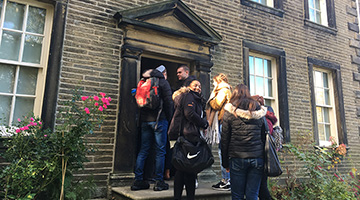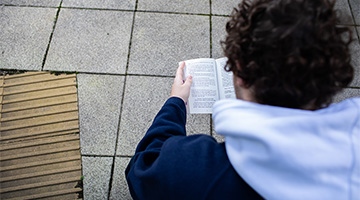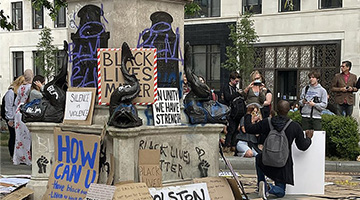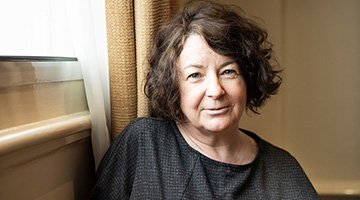About this course
MA English Literature at LJMU offers you the opportunity to pursue advanced study, at the leading edges of the subject, within a vibrant community of scholars.
- Embark on this interdisciplinary MA that studies literature in its diverse forms as a way of exploring complex questions about what it means to be human
- Enjoy a thematic approach to study, based around ideas of place, mobility, bodies and objects
- Explore an eclectic range of texts, periods, theories and genres within these broad themes
- Join a supportive research culture and work alongside emerging and established scholars at the cutting-edge of their subject
- Benefit from a valuable foundation for progression to doctoral research and many other careers in the cultural and heritage industries
The course explores the deeper potential of that most eclectic and interdisciplinary of subjects and extends your reading and research into exciting new areas. You will master skills of research, analysis, argument and writing that are both a vital preparation for doctoral research and highly valued by employers.
The MA English Literature is designed to help you think critically about the role of literature in history and explore some of the new directions scholars in English are taking.
The programme consists of a series of modules each within a theme that highlights key approaches and issues in contemporary literary studies:
- Place and Mobilities examine the way space structures our thinking about literature and culture, rethinking terms such as locality and environment, nation and world
- Objects and Bodies address ongoing debates about the body in history and, more recently, emerging theories of the relation between humans, animals, and things
In all of these modules we explore a wide range of literature from the early modern period to the present, from Britain, America, Europe and beyond.
"I thoroughly enjoyed every aspect of the MA module from beginning to end and I felt that it flowed well throughout the year. My personal experience of the course could not be improved upon. As I reflect back on the MA course and realise how much work I undertook and completed and how much I enjoyed it, it is difficult for me to suggest improvements. I certainly cannot suggest improvements as far as the MA staff are concerned as they could not do more for students. They care about the students and their progress and it is this aspect that is invaluable and, in my view, sets the university apart from other universities."
-English Literature Graduate
Course modules
Discover the building blocks of your programme
Further guidance on modules
Modules are designated core or optional in accordance with professional body requirements, as applicable, and LJMU’s Academic Framework Regulations. Whilst you are required to study core modules, optional modules provide you with an element of choice. Their availability may vary and will be subject to meeting minimum student numbers.
Where changes to modules are necessary these will be communicated as appropriate.
Core modules
Research Methods for English Studies
30 credits
30 credits
This module introduces and develops research skills for students in English Studies. It is intended to guide them as they undertake postgraduate level study, helping them to develop high-level skills in recognising and evaluating research methods and reflecting on and developing their own research and academic writing skills. The module will also give you the opportunity to see yourself as part of a community of postgraduate researchers, and present your ideas to peers accordingly.
Mobilities
30 credits
30 credits
Students studying on this module will demonstrate and apply detailed and informed knowledge and understanding of theoretical and critical concepts in mobility studies, transnationalism, diaspora studies and the global humanities through verbal and visual forms.
Dissertation
60 credits
60 credits
The dissertation assesses your ability to present, in scholarly form, a sustained piece of research which demonstrates knowledge and understanding of a relevant field, methodologies and critical context, organises material into a clear and relevant argument, and shows the ability to work independently.
Place
30 credits
30 credits
Students will be introduced to advanced aesthetic, theoretical, and conceptual approaches to the study of a range of permutations of place. These may include: homes, housing and the country house; the country and the city; urban, suburban, and peri-urban places; the landscape of the everyday; littoral landscapes; the relations of the local, national and the global.
Optional Modules
Public Culture and Collaborative Practice
30 credits
30 credits
Students are supported in finding experience in an institution or sector which interests them as a possible future career. Support is offered from the ML, Student Futures, and Placement Support teams. Representatives from collaborating cultural partners will be involved in facilitating access to resources and expertise within their organisations and will include the possibility of experience on LJMU-affiliated research and archival projects. From this, students will gain insight into the everyday workings of the project and/or organisation, its policies and its politics.
The practice-based element of the module is underpinned by a series of sessions considering the role and reach of the Public Humanities, and the transferable and professional skills embedded in undergraduate and post-graduate studies of English and the Humanities more broadly.
Bodies and Objects: Materiality and Literary Studies
30 credits
30 credits
On objects, the module introduces students to object-orientated ontologies and the social biography of things. The material turn in literary studies has led to a renewed interest in objects in daily life and their significance in works of literature of different period. The module will also explore theories of subject and object relations. On bodies, the module deploys a variety of theoretical perspectives, from gender theory to the medical humanities, to trace the literary history of the body, and to analyse sexuality, race, and class at a corporeal level. The module will examine a range of primary texts across historical periods to examine fundamental questions about the relationship of the material and the corporeal to culture, society, and self.
Your Learning Experience
An insight into teaching on your course
Study hours
The English Literature programme at LJMU benefits from expertise in a wide variety of research areas: early modern cultures, romanticism, nineteenth-century print cultures, contemporary literature and culture, national literatures (especially Irish, Scottish and American) and postcolonial and world literatures.
Teaching methods
Staff in English have published recent books on seventeenth-century theatre, Sherlock Holmes, the 1950s, madness and the romantic poet, women travellers in Norway, shyness, housing, emigrant experience, betrayal, Irish music, the postcolonial intellectual, the cultural memory of Atlantic slavery and contemporary fictions of multiculturalism.
Applied learning
Staff are involved in a number of large-scale collaborative projects such as the building of a replica Elizabethan theatre at Prescot (Shakespeare North), the Archive of Working-Class Writing, the Liverpool Travel Studies Seminar, the War Widows Project and the Marginal Irish Modernisms network. In the most recent research assessment (REF2014), 22% of our research was rated as world leading and 46% as internationally excellent. 50% of our research was rated world-leading for public impact.
Archive of Working-Class Writing, the Liverpool Travel Studies Seminar, the War Widows Project and the Marginal Irish Modernisms network.
In the most recent research assessment (REF2014), 22% of our research was rated as world leading and 46% as internationally excellent. 50% of our research was rated world-leading for public impact.
How learning is monitored on your programme
To cater for the wide-ranging content of our courses and the varied learning preferences of our students, we offer a range of assessment methods on each programme.
Assessments have been designed to develop a creative engagement with different material and confirm your confidence in the discipline.
There will be a variety of assessments spread across modules, including in-class presentations, posters, online contributions, critical reflections and portfolios. The most common piece of assessment will be the extended essay, allowing you to develop advanced techniques of reading, research, writing and presentation.
The course concludes with your completion of a major piece of coursework: a 15,000-word dissertation on a topic of your choice.
Where you will study
The School of Humanities and Social Science offers an ideal environment in which to expand your knowledge and horizons at postgraduate level.Situated on Mount Pleasant in the new Knowledge Quarter of Liverpool, the School is home to five subject areas: English, History, Criminology, Sociology, and Media, Culture & Communication. It offers a wide range of opportunities to expand your knowledge and horizons, with a lively programme of cross-disciplinary research seminars, conferences, visits from international scholars and public events.Research from the School is recognised nationally and worldwide, and staff in the English Department are active in a wide range of fields including early modern cultures, nineteenth century studies, regional and global literature, and contemporary and everyday cultures.
Course tutors

Dr Colin Harrison
Programme leader
Currently, Filippo is working on questions of temporality and inheritance in critical theory, especially the philosophies of Ernst Bloch, Georg Lukacs, and other European authors. He has recently published on Bloch and orientalism in the journal Textual Practice and on Lukacs in International Critical Thought.
Currently, Filippo is working on questions of temporality and inheritance in critical theory, especially the philosophies of Ernst Bloch, Georg Lukacs, and other European authors. He has recently published on Bloch and orientalism in the journal Textual Practice and on Lukacs in International Critical Thought.
Filippos research and teaching interests centre on postcolonial and comparative/world literary studies and critical theory. In particular, his work explores how cultural heritage can be transmitted in contexts marked by the historical realities of imperialism and capitalist globalisation. In his first monograph (Postcolonial Custodianship: Cultural and Literary Inheritance, 2014), he reinterpreted the figure of the postcolonial writer as transmitter of cultural heritage. His second monograph (World Literature, Non-Synchronism, and the Politics of Time, 2020) mobilises German philosopher Ernst Bloch's concept of "ungleichzeitigkeit" or "non-synchronism" as a way of thinking temporal transmission in the work of contemporary writers from Africa and South Asia. Filippo has also published on South Asian women writers (and co-edited a pedagogical volume on the topic for the Modern Language Association) and the tradition of Marxist intellectuals from Rosa Luxemburg to Antonio Negri.
Career paths
Further your career prospects
LJMU has an excellent employability record with 96% (HESA 2018) of our postgraduates in work or further study six months after graduation. Our applied learning techniques and strong industry connections ensure our students are fully prepared for the workplace on graduation and understand how to apply their knowledge in a real world context.
The MA English Literature will enhance your prospects in a wide variety of careers, such as teaching, freelance writing, research, academia, print journalism and the creative and heritage industries.
Tuition fees and funding
- Fee:
- £8,390
The University reserves the right to increase tuition fees in accordance with any changes to the maximum allowable fees set by the UK Parliament. In the event of such a change, any fee increase will be subject to a maximum cap of 10% of the total course cost as originally stated at the time of your offer.
Fees
The fees quoted at the top of this page cover registration, tuition, supervision, assessment and examinations as well as:
- library membership with access to printed, multimedia and digital resources
- access to programme-appropriate software
- library and student IT support
- free on-campus wifi via eduroam
Additional costs
Although not all of the following are compulsory/relevant, you should keep in mind the costs of:
- accommodation and living expenditure
- books (should you wish to have your own copies)
- printing, photocopying and stationery
- PC/laptop (should you prefer to purchase your own for independent study and online learning activities)
- mobile phone/tablet (to access online services)
- field trips (travel and activity costs)
- placements (travel expenses and living costs)
- student visas (international students only)
- study abroad opportunities (travel costs, accommodation, visas and immunisations)
- academic conferences (travel costs)
- professional-body membership
- graduation (gown hire etc)
Funding
There are many ways to fund postgraduate study for home and international students. From loans to International Scholarships and subject-specific funding, you’ll find all of the information you need on our specialist postgraduate funding pages.
Please be aware that the UK’s departure from the EU may affect your tuition fees. Learn more about your fee status and which tuition fees are relevant to you.
- Fee:
- £17,750
International Scholarships and payment plans
Liverpool John Moores University is committed to supporting international students by providing a range of scholarships and flexible payment plans to help students manage their tuition fees.
Scholarships
LJMU provides a variety of scholarships to support international students. Scholarships are available to self-funded students who have accepted their offer and met all the conditions outlined in their offer letter. Students must also demonstrate that they can cover living costs, travel, and other expenses associated to studying at the university. Postgraduate scholarships include tuition fee reductions and are often offered in partnership with external funding organisations.
All self-funded international students are eligible for an automatic scholarship worth up to £4,000. For more details and to view our full list of scholarships, visit the international scholarship webpages.
Deposit
All students must pay a £5,000 deposit before they can receive their CAS letter.
For more information view our deposit page.
Tuition Fee Payment Plan
After paying their £5,000 deposit, students have the option to pay their fees in full or in three equal instalments minus any internal scholarships and discounts. There are two payment options available for international students. You can either pay your tuition fees in full before enrolment or opt for a payment plan. With the payment plan, you can pay your fees in three instalments after making your £5,000 deposit. The first instalment is due before enrolment.
All payments should be made through Flywire. Full details can be found in the How to Pay Guide.
Early Bird Tuition Fee discount
We are excited to introduce a £500 Early Payment Discount to all self-funded international students. Eligible self-funded students who pay their fees by the required deadlines will get a discount which will be automatically deducted from the 1st year of tuition fees.
To see the required deadlines please visit the webpage
Entry requirements
You will need:
Qualification requirements
Undergraduate degree
- 2:1 or above in Literature, Cultural History, or a related subject
Alternative qualifications considered
- Applications are welcomed from highly motivated, non-standard entry students with relevant experience, but without the necessary formal qualifications
Further information
-
Extra Requirements
- You may need to meet university staff as part of the selection process
-
RPL
- RPL is accepted on this programme
International requirements
IELTS
- IELTS English language requirement: 6.5 (minimum 5.5 (minimum 7.0 in written work) in each component)
Further information
-
Extra Requirements
- You may need to meet university staff as part of the selection process
-
RPL
- RPL is accepted on this programme
Please Note: All international qualifications are subject to a qualification equivalency check.
How to apply
Securing your place at LJMU
To apply for this programme, you are required to complete an LJMU online application form. You will need to provide details of previous qualifications and a personal statement outlining why you wish to study this programme.
Your university life
From accommodation and academic support to clubs and societies. Find out what LJMU has to offer.
Related Links
Talk to our students
Connect with a current LJMU student for advice and guidance on university life, courses and more.
See what our students are saying
At LJMU we want you to know you’re making the right choice by studying with us. You can see what our students are saying about their experience with us through their reviews on the following websites:
Related Links
News and views
Browse through the latest news and stories from the university
The University reserves the right to withdraw or make alterations to a course and facilities if necessary; this may be because such changes are deemed to be beneficial to students, are minor in nature and unlikely to impact negatively upon students or become necessary due to circumstances beyond the control of the University. Where this does happen, the University operates a policy of consultation, advice and support to all enrolled students affected by the proposed change to their course or module.





















